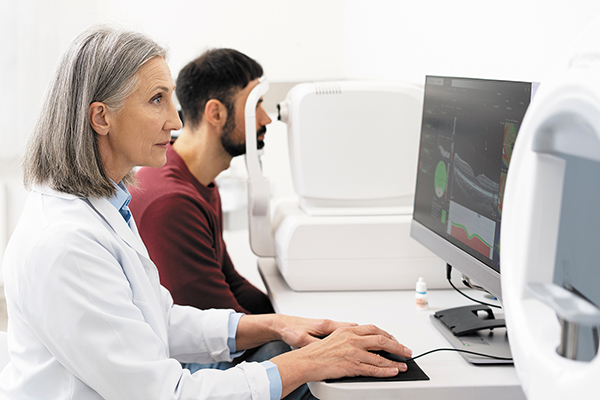
Artificial intelligence (AI) has been making waves around the world for its potential to revolutionise every aspect of both life and work. From speeding up tasks through automation to enabling the accurate analysis of vast amounts of data, the technology is fast proving its value. The healthcare sector is already harnessing AI, with providers starting to adopt it to deliver both better outcomes and a positive experience for patients.
Healthcare leaders are interested in tapping into the technology to take advantage of the potential it offers in areas such as diagnosis and treatment, intelligent proactive care, remote patient monitoring, drug discovery and care-associated administrative tasks. For example, AI tools can automate tasks such as scheduling, billing and claims processing, freeing up healthcare professionals to focus on crucial patient care. When it comes to diagnosis and treatment, AI is considered groundbreaking because its algorithms can analyse medical images such as x-rays and CT scans with high accuracy, offering the potential for more precise and earlier disease detection – something that is vital to improving outcomes for patients with diseases such as cancer.
The technology’s analysis of patient data – such as genetics, medical history and lifestyle – offers medical teams the ability to predict individual responses to therapies, so they can personalise treatment plans, optimise outcomes and reduce potential side effects.
As a major destination for international medical tourism, London is well positioned to harness the opportunities offered by AI in a way that benefits the thousands of patients from around the world who choose the UK’s capital for healthcare and treatment.
The technology is particularly well suited to this market because it provides a new level of convenience, enabling patients to be remotely monitored and a greater part of their medical journey – such as x-rays and post-operative rehab – to be managed in their home country. They get access to London’s world-class specialists and facilities throughout their treatment, but only need to visit the capital for key in-person elements such as immediate pre-operative assessment and the surgical procedure itself.
AI adoption within London’s healthcare settings is in its initial and developing stages, with significant potential demonstrated in numerous pilots and roll-outs, paving the way for deeper integration into the healthcare system. For example, NHS North East London is implementing AI-guided clinical coaching aimed at easing pressure on urgent and emergency care services.
Barts Health NHS Trust reported in March 2025 that about 40 different AI applications were being used in its hospitals for tasks as varied as reducing the administrative burden, improving operational efficiency and analysing data and images to enhance clinical decision making.
The trust is trialling an online history-taking software in emergency care to identify high-risk patients, while its radiologists are using an AI tool to analyse chest x-rays, helping them to prioritise the most urgent cases. It is also piloting an application that scans blood film images to indicate the risk of leukaemia.
Other trials at the trust include the use of AI by podiatrists to identify diabetic foot disease, and a respiratory team that is using the technology to analyse NHS data to identify patients at risk of lung cancer.
Patients at private healthcare provider HCA Healthcare UK have access to an AI-powered medical imaging solution that assesses the risk of a serious heart condition or heart attack – many years before symptoms appear. The software quantifies coronary inflammation and characterising plaque based on routine coronary CT angiography (CCTA).
A research team at Moorfields Eye Hospital and the UCL Institute of Ophthalmology has been involved in groundbreaking work using eye scans and AI to identify markers that indicate the presence of Parkinson’s disease in patients on average seven years before clinical presentation. This is the first time that anyone has been able to show these indicators so far ahead of diagnosis.
The Royal National Orthopaedic Hospital (RNOH) is applying AI to the assessment of bone health, with a tool that measures bone mineral density (BMD) from conventional digital x-rays. Meanwhile, the use of AI isn’t being confined only to hospitals and medical applications. NHS South East London Integrated Care Board has introduced the technology to reduce the average wait time for patients to register with a GP practice from days to hours.

The breadth of AI projects in London highlights the prospects for further development and roll-out across the capital – if some of the challenges can be overcome. Key growth areas include improving digital and data infrastructure and fostering trust in AI tools, with both being essential for unlocking scalability and ensuring transformative impact.
One area of focus is the need for suitable governance structures and support to ensure that the technology is deployed in a fair and principled way. Progress in this area includes the NHS South East London Integrated Care Board’s March 2025 launch of an AI framework to deliver safe and ethical pathways to enable the effective use of AI tools.
Another area of concern for those constructing AI solutions for deployment in London’s healthcare sector is ensuring that bias is not unintentionally built into such tools and applications. Avoiding this is vital to ensuring that all patients have access to the same level of care and diagnostic support, regardless of their ethnicity, gender or socioeconomic background.
Other challenges include securing sustainable funding, building the necessary digital infrastructure and ensuring that staff have the knowledge and capacity to engage with new technologies. This last challenge is considerable, with a survey by healthcare AI research and development company Corti and YouGov revealing that less than one in four UK healthcare professionals say they feel comfortable with their ability to use AI tools, while 35% admit that they are unaware of how the technology could be applied to their work.
AI adoption is considered to still be at an early stage in the UK’s healthcare sector, something that is borne out by the Corti/YouGov research, which revealed that the majority of the UK’s healthcare professionals are not using AI at work – and 73% have never done so. Consequently, there are many opportunities both to broaden and deepen the use of the technology across London and the rest of the UK.
While initiatives are being developed to address the barriers to AI deployment, the appetite for the technology is growing. In July 2024, think tank The Health Foundation found that more than half of the UK public (54%) and three-quarters of NHS staff (76%) supported the use of AI to help with patient care, while an even greater proportion said they supported the use of the technology for administrative purposes (61% of the public and 81% of NHS staff surveyed).
Future innovation and adoption
The growing enthusiasm for AI shown by patients and medical practitioners has been matched by the UK government’s ambitions for the technology. In early 2025, it signalled its support through the AI Opportunities Action Plan, a strategy to position the country as a leader in AI innovation. Wes Streeting, the UK’s Secretary of State for Health and Social Care, has also committed to the technology, saying that the NHS will “harness artificial intelligence to deliver faster and smarter care across the country”.
London is well positioned to match its world-class healthcare expertise with the latest AI techniques, as a March 2025 report from UCL Partners and The Health Foundation, AI in London Healthcare: the Reality behind the Hype, reveals: “With world-class medical institutions, top-tier universities and a thriving tech ecosystem, the city is at the forefront of innovation. Its rich, diverse, multimodal data resources could further help to advance AI development. By building a collective ecosystem for responsible AI integration, London’s healthcare system can lead the way globally in enhancing AI’s full potential to drive meaningful, system-wide transformation.”
Globant creates digitally-native products that bridge the gap between businesses and consumers through technology and creativity.
For more details on Globant's innovations in the healthcare sector, visit www.globant.com/healthcare